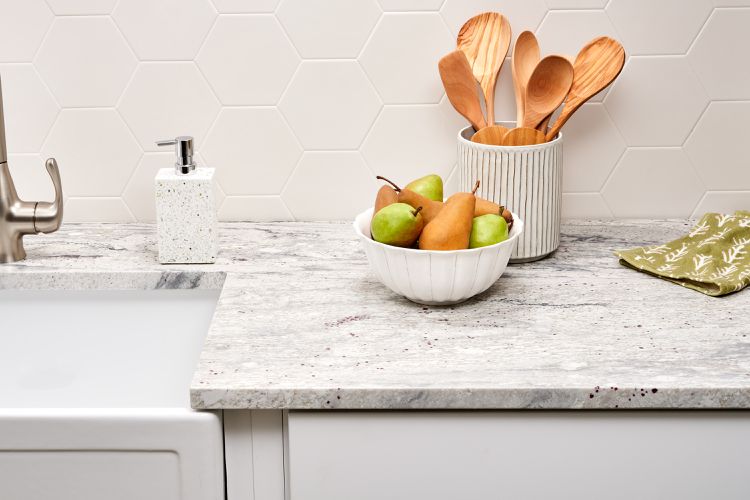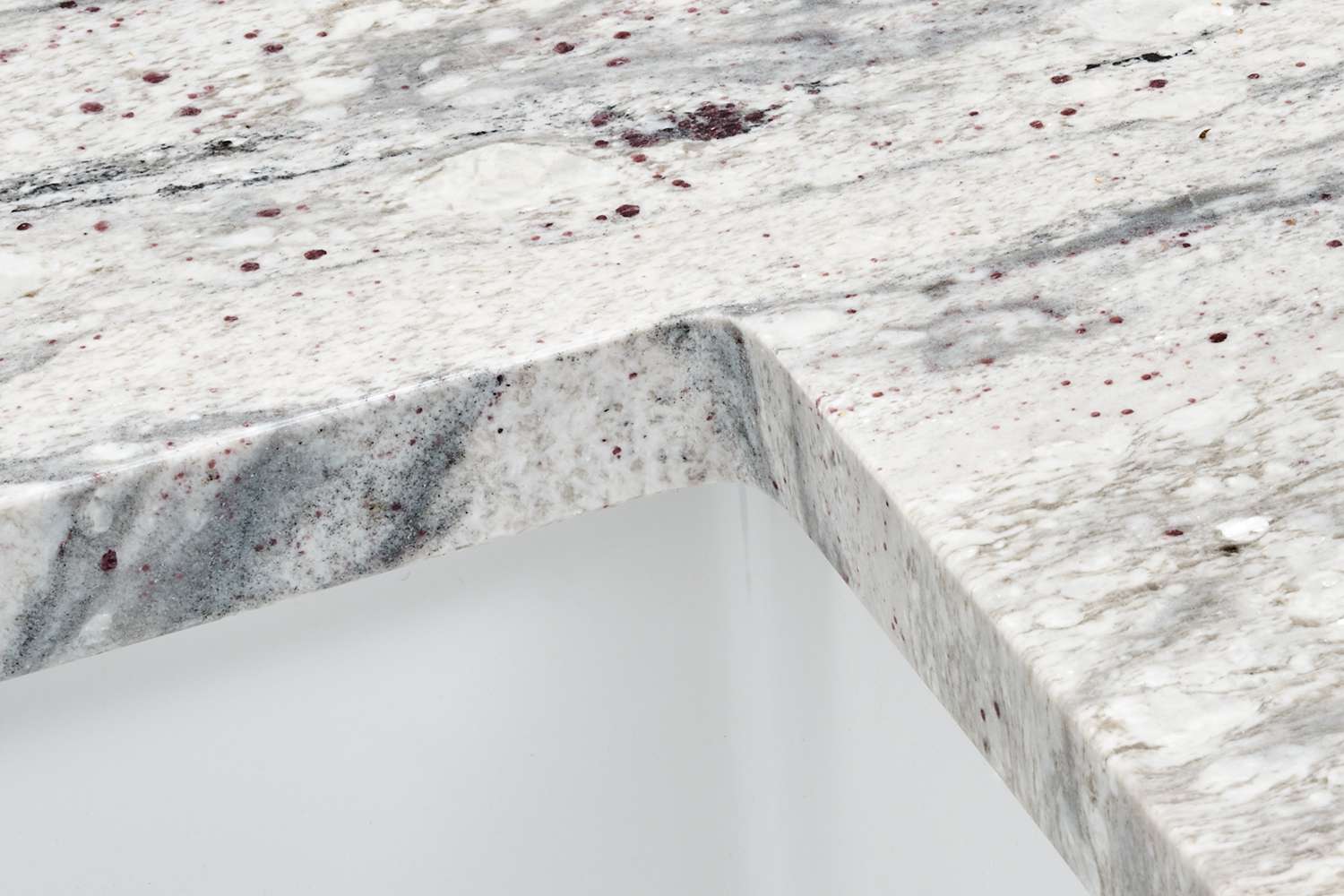Contents

Granite remains a highly sought-after premium option for kitchen and bathroom countertops, even as it faces competition from synthetic composites and engineered stones like quartz. Regardless of current trends, authentic granite countertops, crafted from slabs extracted from natural stone blocks, provide a unique aesthetic that synthetic materials cannot replicate. In terms of functionality, granite is an excellent choice for countertops, as it is resistant to heat and scratches, and its stain resistance can be enhanced through regular sealing.
Ways to Seal Granite Countertops
- Durable
- Increases the value of the property.
- Distinctive look
- Simple to maintain cleanliness
- Offers scratch resistance.
- Expensive
- Not suitable for do-it-yourself projects.
- Fixing things can be challenging.
- Needs regular sealing.
What exactly is granite?
Differentiating granite from other natural stones or from the more lifelike varieties of synthetic engineered stone can be challenging at times. Granite is classified as an igneous rock, as it is formed from volcanic magma that rises from the Earth’s interior, cools, and solidifies. This sets it apart from marble, which is a metamorphic rock created through the transformation of sedimentary rock under immense pressure and heat over millions of years.
Granite primarily consists of quartz and feldspar, along with trace amounts of mica and various other minerals. Its coloration is influenced by the minerals present, resulting in shades that can vary from nearly black to nearly white, with possibilities of pink, red, green, and blue hues. Typically, the stone features numerous tiny black grains of amphibole interspersed among the colored minerals. Unlike marble, which often exhibits delicate veining, granite generally lacks this characteristic, and its crystals are distinctly visible upon closer examination.
As synthetic engineered stones have advanced in quality, it has become more challenging to differentiate them from granite. However, a careful examination of a granite countertop reveals that its crystals vary in size and are arranged in a random pattern. In contrast, engineered stone exhibits a consistent and uniform appearance across its surface.

Choices for Granite Countertops
Types
- Granite slabs represent the traditional choice for countertops, typically consisting of a single, unbroken piece of quarried stone, frequently devoid of seams. This is the priciest variant of granite, and installation is almost exclusively carried out by professionals, given the weight and cost of the slabs, making them impractical for do-it-yourself projects.
- Modular granite is a more affordable variant of granite that consists of sizable pieces arranged next to each other to create a countertop. While a countertop crafted from modular granite will have seams, it will have fewer than a tiled surface. This type of granite is also fairly straightforward for a DIY enthusiast to install.
- Granite tiles resemble those utilized in flooring applications. Their installation process is quite similar to that of ceramic or porcelain tiles, and they share certain disadvantages when employed as countertops, such as grout lines that can be challenging to keep clean. However, in contrast to granite slabs, these tiles are more suitable for DIY projects.
Finishes
- Glossy: This is the most favored finish, giving the surface a shiny, reflective appearance.
- Honed: This surface treatment features a non-reflective, matte look without any gloss or shine.
- Leathered: A finish that features a textured appearance while preserving the natural hues and tones—this is a more recent style of treatment.
- Flamed: This unique finish features a subdued look characterized by a softened color palette.
- Caressed: Achieved through the refinement of a leathered surface, it exudes a blend of toughness and sophistication.
Cost of Granite Countertops
The price of granite countertops can differ significantly based on the specific type of granite selected and the local labor rates. In fact, the costs of granite countertops have decreased recently, largely due to the rising demand for synthetic engineered stone.
According to national data, the price of granite slab countertops ranges between $40 and $60 per square foot. Although the granite material itself is much cheaper, there are no affordable DIY alternatives, which positions slab granite among the pricier countertop options.
Modular granite generally ranges from $25 to $40 per square foot, offering an affordable alternative for those seeking the appearance of granite while opting for a DIY approach. These countertops are produced in sections, packaged as kits tailored to your specifications. However, it’s important to note that modular granite may not provide the same increase in property value as solid slab countertops.
Granite tiles typically range in price from $5 to $15 per square foot. While this price point makes them a budget-friendly option, granite tile countertops are generally considered to be of lower quality compared to solid slabs, which could lead to a less favorable perception in the real estate market.
Granite is regarded as one of the pricier choices for countertops. It is definitely more costly than laminate or ceramic tiles. However, when compared to more luxurious materials like marble, it may appear to be a more budget-friendly option. Additionally, the cost of granite can fluctuate significantly depending on the color and the supplier.
Upkeep and Restoration
Granite is an extremely durable material, making it highly resistant to scratches. This is advantageous, as making repairs can be quite challenging, if not unfeasible. While it is sometimes possible to fix cracks, fissures, and chips with an epoxy or resin that matches the granite’s color and pattern, these repairs often remain visible. Professional fabricators typically perform these repairs more effectively than most DIY enthusiasts, although the cost can be significant.
Although granite outperforms marble as a countertop material, it remains a somewhat porous stone that can benefit from sealing to enhance its stain resistance. Typically, granite countertops are sealed prior to installation, and it is essential to periodically reseal them to maintain a stain-resistant surface.
Design
Granite countertops suit a wide range of home aesthetics, from casual farmhouses to elegant French estates. They not only bring a touch of luxury but also offer a natural charm, being a product of the earth. While some design experts argue that natural stone has become somewhat outdated, overshadowed by synthetic engineered stone or eco-friendly composites, granite remains a classic option. In many residences, it can significantly enhance the property’s value.
Granite comes in an unexpectedly diverse array of colors. While shades of gray, pink, and red are the most prevalent, there are also options in blue and green, along with nearly pure whites and blacks.
Installation of Granite Countertops
Working with solid slab countertops can be quite challenging, which is why they are typically managed by skilled professionals, often employees or contractors from the company that processes the raw slab. A consultant typically comes to your residence to take precise measurements, after which the countertop is crafted in a workshop, incorporating any necessary cutouts for sinks and other fixtures.
Typically, the customer participates in the selection of the slab, which can be done by choosing from small samples, viewing slabs showcased at the retailer, or by selecting and coordinating the shipment of the slab from a national supplier. Once the slab is fabricated, the installation team brings the countertop and sets it up, a procedure that generally requires just one to two hours.
DIY enthusiasts can install modular granite and granite tiles themselves, as hiring professionals would typically negate any savings.
Leading Brands of Granite Countertops
Granite countertops are typically produced and marketed by local businesses, as transporting these heavy surfaces over long distances can be quite expensive. These local companies source thin, polished slabs from domestic suppliers, who, in turn, import raw slabs from countries such as Brazil, Italy, India, and China. Additionally, some basic granite is extracted from domestic quarries in states like Vermont and Virginia, but this type of stone is primarily utilized for construction rather than for high-end interior applications.
Notable national suppliers of granite slabs and granite countertop materials consist of:
- Marble Warehouse, situated in Van Nuys, CA, provides a diverse selection of raw granite slabs and granite tiles, featuring a broader array of colors and designs compared to many fabricators. Typically, customers purchase the slabs and coordinate shipping to a nearby contractor, who then fabricates and installs the countertops.
- Granite Countertops is a nationwide network of stone countertop manufacturers, dedicated to linking you with local experts who provide comprehensive services from beginning to end.
- Bedrock Creations specializes in providing prefabricated modular granite countertops, primarily catering to do-it-yourself enthusiasts.
- Keystone Granite and Tile stands out among national retailers, providing an extensive range of granite slab countertops and offering local installation services.
Furthermore, nearly all prominent suppliers of ceramic tiles offer granite tiles as well, with some providing modular countertops. Large retail chains like Home Depot and Lowe’s, along with local renovation businesses, also stock granite countertops for easy access.
Granite versus Engineered Stone (Quartz) Countertops
For those seeking the durability of granite while desiring a wider range of design possibilities, engineered stone countertops are a great alternative. This material is created by combining crushed natural stone, primarily quartz, with resins, which are then molded into sheets and shaped into various forms for construction purposes. Popular brands of engineered stone include Cambria, Silestone, and Caesarstone.
Engineered stone comes in a virtually endless variety of colors and textures. It serves as a high-end countertop option that significantly enhances the value of your home. Originally designed as a cost-effective substitute for natural stone, engineered stone has, in many instances, surpassed granite in price.
Synthetic stone boasts several benefits, including its consistent quality, easy availability, and a wider array of design possibilities compared to granite. Many buyers are drawn to synthetic stone for its eco-friendly attributes, as it is produced from leftover stone materials and does not involve quarrying, which can alter natural landscapes. Furthermore, it is recognized as one of the toughest materials, often exhibiting greater scratch resistance than granite. The price of synthetic stone can vary significantly, ranging from approximately $50 to $175 per square foot, depending on the specific type. On a national scale, the average cost for materials and installation of engineered stone countertops is around $125 per square foot.
Are Granite Countertops the Perfect Choice for You?
For those seeking a high-quality countertop material and who can take care to prevent spills and stains, granite countertops are an excellent choice. This premium material brings a classic elegance to any residence. Additionally, granite tends to be more affordable compared to some of the more fashionable alternatives, like engineered stone and composite surfaces.


 How to Repair Nail Holes in Trim
How to Repair Nail Holes in Trim What is the lifespan of a reglazed bathtub?
What is the lifespan of a reglazed bathtub? Steps for Properly Installing a Towel Bar
Steps for Properly Installing a Towel Bar